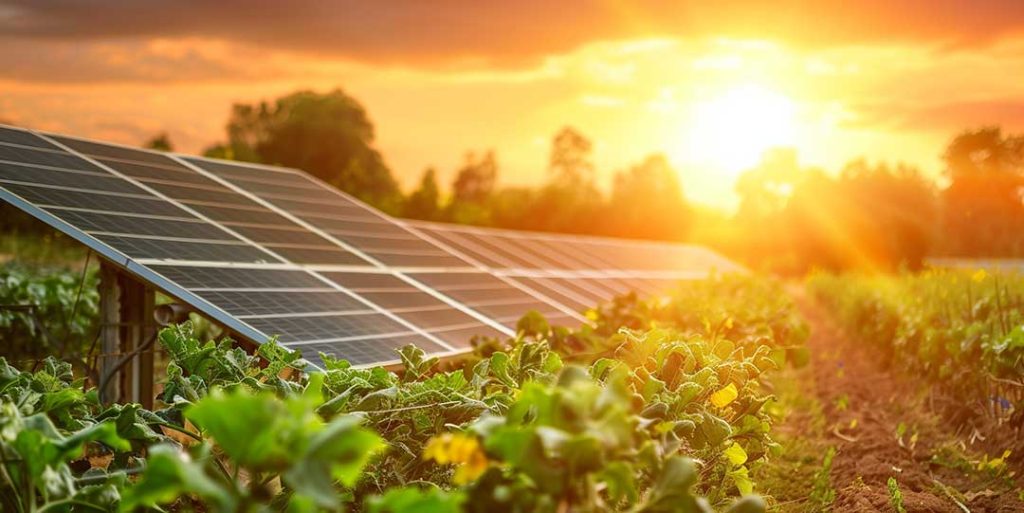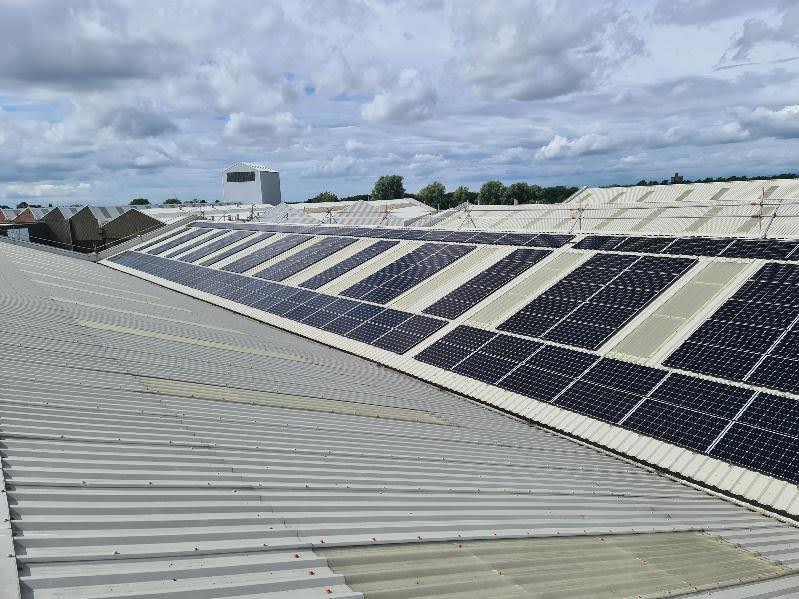Cost Savings and Energy Independence
The incorporation of solar panels into agricultural operations marks a significant step towards cost efficiency and energy independence.
By reducing dependence on grid electricity, farms can circumvent the unpredictability of energy prices and the hefty utility bills often associated with traditional energy sources.
Solar energy offers a sustainable and economically viable alternative, providing farmers with a level of predictability and control over their operational costs.
This independence not only stabilises the farm’s finances but also contributes to national energy security by reducing overall demand on the grid.
In the long term, the financial benefits of solar energy are multifaceted. The initial investment in solar technology pays dividends by significantly lowering operational costs over time.
Additionally, many governments and utility companies offer incentives for renewable energy adoption, such as tax credits and rebates, which can further offset the upfront costs.
These financial mechanisms not only accelerate the return on investment but also promote a wider adoption of solar energy within the agricultural sector, enhancing its sustainability and economic resilience.
Increased Profitability
Adopting solar energy can substantially enhance the profitability of farming operations.
By transitioning to solar power, farms can drastically reduce their energy expenditures, reallocating these savings into other areas of the business to stimulate growth and profitability.
Furthermore, the excess electricity generated by solar panels can be sold back to the grid in many regions through programs like net metering, creating an additional revenue stream.
This not only boosts the farm’s income but also contributes to the stability and sustainability of the local power supply.
Moreover, solar installations can increase the value of agricultural land, making it a more attractive asset to potential buyers or investors.
This appreciation in land value, coupled with the potential for increased income from energy sales and savings, makes solar energy a compelling investment for forward-thinking farmers.
As the agricultural industry continues to evolve, the economic incentives provided by solar energy adoption will play a crucial role in shaping a more sustainable and profitable future for farms worldwide.
Environmental Sustainability
The shift towards solar energy in agriculture represents a significant move towards environmental stewardship.
Solar panels offer a clean, renewable source of power that reduces reliance on fossil fuels and minimises greenhouse gas emissions.
This transition not only combats climate change but also supports the preservation of local ecosystems by reducing pollution and conserving water resources.
By adopting solar energy, farms can significantly diminish their environmental footprint, contributing to a healthier planet for future generations.
Additionally, solar energy’s low impact on the environment extends to the preservation of land and water quality.
Unlike some traditional energy sources, solar panels do not require water for cooling, thus conserving vital water resources for agricultural and community use.
This sustainable approach to energy production supports broader environmental conservation efforts, aligning agricultural practices with the urgent need for global environmental sustainability.
Drought Resilience
Solar-powered irrigation systems represent a pivotal innovation for enhancing drought resilience in agriculture. By utilising solar energy to power irrigation, farms can maintain crop production even during periods of water scarcity.
These systems are particularly beneficial in arid regions where water conservation is critical.
Solar-powered irrigation offers an efficient method to distribute water directly to the roots of plants, minimising waste and ensuring that crops receive the necessary hydration to thrive, even in challenging conditions.
The adoption of solar-powered irrigation systems also underscores the importance of sustainable water management practices in agriculture.
By reducing dependence on traditional, energy-intensive water extraction and distribution methods, farms can better manage their water usage and preserve precious water resources.
This sustainable approach not only ensures the continued productivity of the land but also contributes to the overall resilience of the agricultural sector in the face of climate change and water scarcity.
Remote Monitoring and Automation
The integration of solar energy into agricultural practices has been further enhanced by advancements in technology, particularly in remote monitoring and automation.
Solar-powered sensors and monitoring systems enable farmers to collect and analyse data on various aspects of farm operations, from soil moisture levels to crop health.
This real-time information allows for more precise and efficient resource management, reducing waste and improving productivity.
Moreover, these systems can be operated remotely, saving time and labor costs, and enabling more agile responses to changing conditions.
Furthermore, solar energy supports the automation of numerous farming tasks, from irrigation to feeding systems.
These automated systems, powered by renewable energy, increase operational efficiency and can lead to significant improvements in crop yields and livestock management.
The use of solar-powered technology in these applications not only reduces the carbon footprint of farming operations but also demonstrates the potential for renewable energy to drive innovation in agriculture, making farms more sustainable and productive.
Community Engagement and Brand Reputation
Incorporating solar energy into agricultural operations can significantly enhance a farm’s brand reputation and engagement with the community.
Today’s consumers are increasingly environmentally conscious, seeking products that are produced sustainably.
Farms that utilise solar energy can market their products as environmentally friendly, attracting a wider customer base and potentially commanding higher prices.
This commitment to sustainability can also strengthen relationships with local communities, as farms contribute to regional environmental goals and demonstrate responsible stewardship of natural resources.
Beyond consumer appeal, adopting solar energy reflects a farm’s commitment to innovation and sustainability, qualities that resonate with employees, suppliers, and business partners.
This can lead to enhanced morale, stronger business relationships, and a positive corporate image.
By leading the way in environmental responsibility, farms can set new standards within the agricultural sector, inspiring others to adopt sustainable practices and contributing to a more sustainable future for all.
Long-Term Reliability
The long-term reliability of solar panels is a key advantage for their adoption in agriculture. With lifespans extending beyond 25 years, solar installations offer a durable and consistent source of energy.
This longevity ensures that farms can benefit from a steady supply of electricity over many years, providing a reliable foundation for planning and investment.
The predictability of solar energy output, coupled with minimal maintenance requirements, makes it an ideal solution for farms seeking to secure their energy future and reduce operational uncertainties.
Moreover, as technology advances, the efficiency and productivity of solar panels continue to improve, further enhancing their value as a long-term investment.
The stability provided by solar energy allows farms to focus on innovation and growth, secure in the knowledge that their energy needs are met in an environmentally and economically sustainable manner.
The adoption of solar panels is not just a step towards greener farming practices but a strategic decision that positions farms for success in a rapidly evolving agricultural landscape.
Get in touch with Kast Energy today for more information on our solar panel service.





